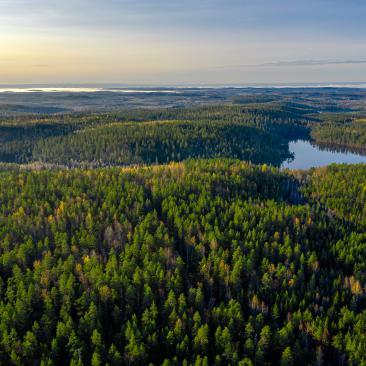The main driver of deforestation and forest degradation is the expansion of agricultural land, which is linked to the production of commodities that are imported such as soy, beef, palm oil, wood, rubber, cocoa, and coffee. As a major economy and consumer of these commodities linked to deforestation and forest degradation, the EU wants to answer the strong call of European citizens to lead the way to solve it.
The European Commission has introduced the European Union Deforestation-free Regulation (EUDR) which entered into force on June 29, 2023. It aims to minimise EU-driven deforestation and forest degradation by promoting the consumption of ‘deforestation-free’ products and reducing the EU’s impact on global forest deforestation and forest degradation.
FSC certification is strongly aligned with the EU’s Deforestation-free Regulation and can be used to meet EUDR requirements.

How can FSC support?
FSC brings nearly 30 years of experience in employing a market-based approach to tackle deforestation and degradation. With its sustainability requirements covering both environmental and social aspects, FSC certification already provides a strong foundation for businesses to build on to meet their EUDR obligations.
Robust certification schemes such as FSC cannot be used to exempt companies from their due diligence obligations; at the same time, FSC can be key in supporting them to assess and mitigate risks in their due diligence duties in a systematic and cost-effective way.
How does this impact Australian and New Zealand companies?
Companies will have until 29 December 2024 to adapt and meet the new EDUR requirements. Therefore, it is essential that Australian and New Zealand wood product companies that export into EU markets, are aware of the rules outlined in the regulation.
Before putting any product on the EU market, operators must produce a due diligence statement to ensure that only deforestation-free and legal products (according to the laws of the country of origin) are allowed on the EU market.
Due Diligence Process
- Gather product information – Operators will be required to collect information regarding quantity, geolocation, legality, and deforestation. (Article 9, EUDR)
- Conduct risk assessment – Operators will be required to conduct a risk assessment to establish whether there is a risk that the relevant products intended to be placed on the market or exported are non-compliant. This includes consideration for the presence of Indigenous Peoples in the area the product is produced. (Article 10, EUDR).
- Mitigate risks – If the risk assessment reveals no, or only negligible risk, then risk mitigation may not be necessary. However, if there is reasonable doubt, operators will be required to develop risk mitigation procedures and measures such as independent audits. (Article 11, EUDR)
FSC is the world’s most credible sustainable forestry solution and is aligned with the European Union Deforestation-free Regulation’s (EUDR) aim to minimize deforestation and forest degradation.
The FSC system has always had strong social protections for Indigenous Peoples and workers; strong standards that prevent deforestation and degradation. In addition, FSC has strategic partnerships and investments in new technologies to enable digital traceability, including geolocation and blockchain. These key features will help companies meet their obligations in the EU’s deforestation regulation.
With the aim to be the best compliance solution, FSC is currently conducting a rapid assessment to evaluate how our standards align with the final text of EUDR (released in June 2023). This step will also identify which steps can be taken to further support organizations seeking compliance with EUDR and other European Green Deal initiatives.
To learn more about FSC & EUDR, check out these resources:
European Commission Resources
- Final text of the EUDR, European Commission
- Questions and Answers on the new rules for deforestation-free products, European Commission
- Frequently Asked Questions – EU Deforestation Regulation
FSC & EUDR
- FSC ‘Wood you find it?’ event summary and webinar recording.
- ‘Forest of the Future’ podcast episodes on EUDR:
